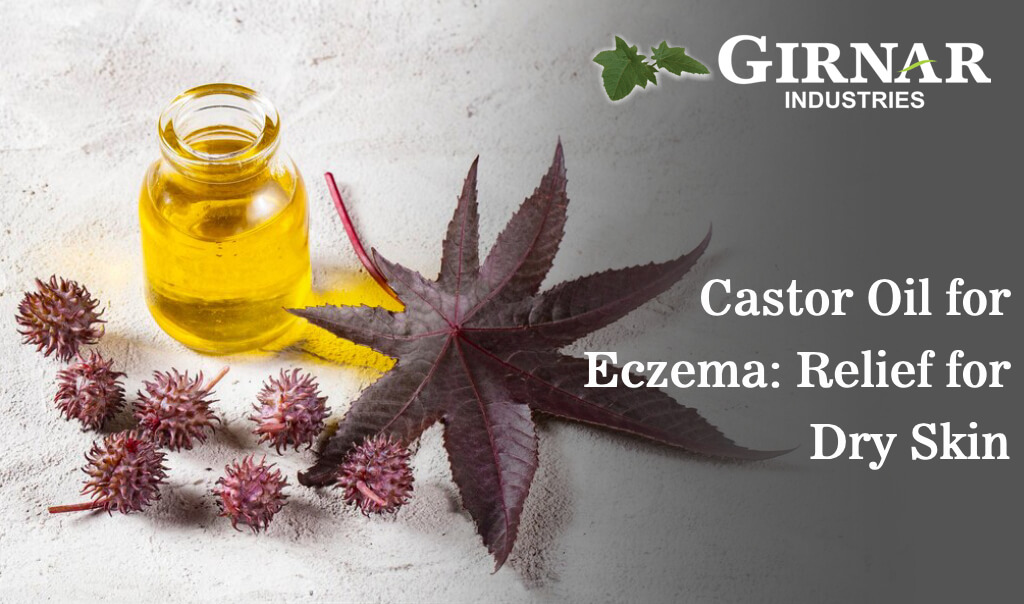Eczema is a long-term skin disease that causes patches of skin to become dry, itchy, and red. It can also be very annoying and painful, especially for little kids. Even though eczema can’t be cured, there are ways to deal with its effects and feel better. Castor oil for eczema is a natural treatment that is becoming more popular.
Benefits of Castor Oil for Eczema
Castor oil comes from castor beans and has been used in traditional treatments for hundreds of years. Even though more study needs to be done on how well it works for eczema, here are some possible benefits that make it an interesting choice:
- Moisturization: Castor oil keeps skin moist because it is thick and moisturizing. When eczema flares up, this can help soothe dry, itchy spots.
- Anti-inflammatory properties: Castor oil contains ricinoleic acid, a fatty acid that might help reduce inflammation. When your eczema flares up, this might help alleviate the redness, swelling, and pain.
- Wound healing: Castor oil may benefit people with eczema who have cracked or broken skin. It may help wounds heal faster.
- Antimicrobial effects: Some studies show that castor oil may kill microbes, which could help prevent infections in people with eczema.
How to Use Castor Oil for Eczema
Here is how to use castor oil for eczema in a safe manner, in case you are interested in giving it a try:
- Choose high-quality oil: The best castor oil to buy is one that has not been heated and does not contain any hexane. So, you can be sure that the oil is clean and hasn’t been mixed with any harsh chemicals.
- Do a patch test: Do a patch test on a small area of healthy skin inside your arm before putting castor oil directly on eczema spots. Put a little oil on it and wait 24 hours. If the product makes your skin red, irritated, or burned, stop using it.
- Dilute the oil: This plant’s oil is thick and sometimes greasy. To make it easy to use, mix it with a carrier oil like almond, jojoba, or coconut oil.
- Apply to affected areas:Apply a thin layer of castor oil (diluted or not) to eczema patches after making sure you won’t have an allergic response. You can use a cotton ball or put it on your skin directly.
- Frequency: You should begin by applying castor oil at least twice a day. You can raise the frequency if needed, but watch out for any soreness.
- Moisturize regularly: Castor oil isn’t a suitable substitute for over-the-counter eczema creams. Use it along with the treatment plan your doctor has given you.
Safety Precautions:
- Not for ingestion: It’s not a good idea to drink castor oil.
- Not for open wounds: If you have any cuts or scrapes, don’t use castor oil on them.
- Discontinue if irritation occurs: If your skin turns red, itches, or your eczema symptoms get worse after using castor oil, stop using it and see your doctor.
For more information:- castor oil for scars
Castor Oil for Eczema: Before and After
Castor oil might make a slight difference in rashes right away. It works best if you use it regularly and monitor the results. Here are some things that could happen:
Before: Sometimes, your eczema spots may be dry, itchy, red, and swollen.
After: With consistent use, castor oil may help:
- Dryness and irritation should be reduced.
- Reduce the appearance of redness and irritation.
- Make the face softer.
- Cracked or broken skin should heal faster.
Remember: Everyone’s story is unique when it comes to eczema. Castor oil has mixed reviews; some report great results, while others report no change.
Conclusion
Castor oil for eczema is a natural treatment that might help with itchy, dry skin. Its anti-inflammatory and moisturizing effects show promise. However, research is still in its early stages. Before you use castor oil, you should talk to your doctor, especially if you have severe eczema or are taking other medicines. If you have eczema, remember that castor oil shouldn’t replace the medicine your doctor has recommended. However, it can help you manage your condition.
FAQ’S
What is the best oil for eczema itching?
Even though there isn't a single best oil, coconut or sunflower seed, oil can help some people with eczema who are itchy. These oils help lower inflammation and keep dry skin moist.
Can I use castor oil on my eczema?
It can help with inflammation, but there isn't good evidence that it particularly helps eczema. It can also be thick and make some skin types feel bad.
Does Shea butter help with eczema?
Shea butter is a thick moisturizer that can help soothe dry, itchy skin caused by eczema. It might clog pores for some people, but it's a good choice for others. Before applying it to eczema spots, test a small amount on the inside of your arm.
Can coconut oil cure eczema?
No, coconut oil won't help with eczema. But, as we already said, it might help with some symptoms, like itching and dryness. Keep in mind that coconut oil can clog some people's pores.
Can apple cider vinegar cure eczema?
No, eczema isn't cured with apple cider vinegar. Even though there is no fix for eczema, this may help ease the itching and dry skin that come with it. Because it's slightly acidic, like healthy skin, it may also help with some kinds of eczema. But it might bother some people's skin.


